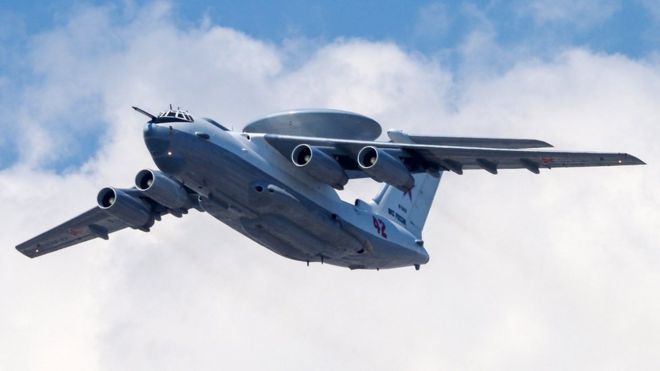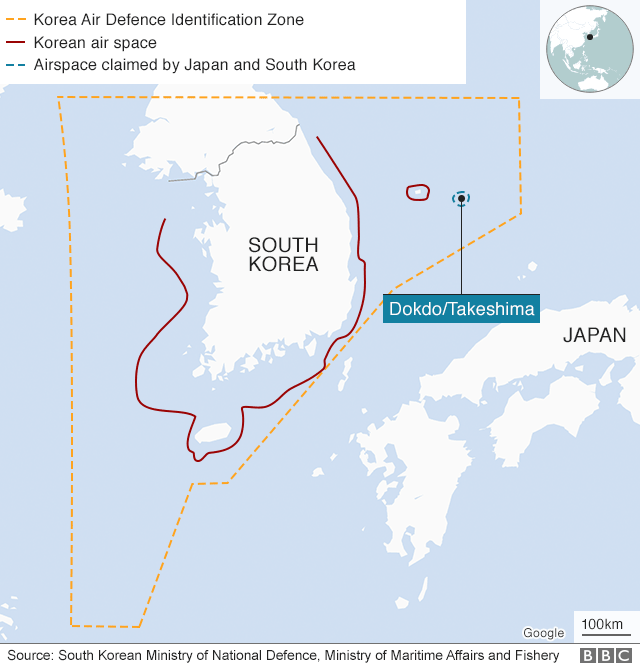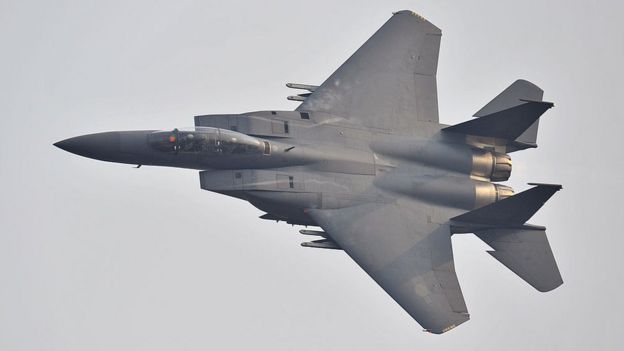
Russia has strongly denied ever apologising for violating South Korean airspace, as the fall-out from an incident involving warplanes from four countries continues.
South Korea's presidential office earlier said a Russian official had expressed "deep regret" for Tuesday's aerial intrusion.
It says a Russian aircraft twice violated its territorial airspace during a joint exercise with China.
But Moscow denies any intrusion.
"We have seen statements in the South Korean media quoting words allegedly said by our acting military attaché," a spokesman for Russia's embassy in South Korea said, according to Interfax news agency.
"We have paid attention to these statements. In this connection we can speak for ourselves that there is a lot in them which does not correspond to reality."
South Korean jets fired nearly 400 warning shots and 20 flares on Tuesday near the Russian surveillance plane that both it and Japan said flew near disputed islands in the Sea of Japan, also known as the East Sea, that the two countries claim.
On Wednesday, South Korea's government said that a Russian official had admitted the violation on Tuesday, saying it was unintended and that Moscow would immediately launch an investigation into the case, which the official blamed on a "technical glitch".
"Moscow said if the aircraft flew according to an initially planned route, this incident would not have occurred," a spokesman for the presidential Blue House, Yoon Do-han, told reporters.
Meanwhile, China has defended the exercise, which was the first ever joint air patrol between it and Russia.
Defence ministry spokesman Wu Qian told reporters they "strictly abided by the relevant regulations of international law and did not enter the airspace of other countries".
Japan also scrambled bombers during Tuesday's incident.
What happened on Tuesday?
The alleged incursion happened over the disputed Dokdo/Takeshima islands, which are occupied by South Korea but also claimed by Japan.
South Korea's military said that in total three Russian and two Chinese military aircraft entered the Korea Air Defence Identification Zone (KADIZ) on Tuesday morning.
One of those planes - an A-50 Russian surveillance plane - also violated its territorial airspace twice, it said, before leaving.


South Korea said its jets fired flares and machine-gun warning shots when the Russian plane intruded. It also deployed F-15 and F-16 planes to intercept it.
Russian and Chinese bombers and reconnaissance planes have occasionally entered the zone in recent years, but this is the first incident of its kind between Russia and South Korea.
 GETTY IMAGES
GETTY IMAGES
Russia's defence ministry denied any airspace violation and said it did not recognise the KADIZ.
Russia also accused the South Korean pilots of "hooliganism in the air", saying that the patrol had been more than 25km from the Dokdo/Takeshima islands.
Lt Gen Kobylash said Russia had complained to South Korea about its crews' "illegal and dangerous actions".
How has Japan responded?
The government in Tokyo lodged a complaint against both Russia and South Korea.
Because it claims sovereignty over the islands, Japan's government said that Russia had violated its airspace.
It also said that South Korea's response had been extremely regrettable.
Japan's Chief Cabinet Secretary Yoshihide Suga said: "In light of Japan's stance regarding sovereignty over Takeshima, the South Korean military aircraft's having carried out warning shots is totally unacceptable and extremely regrettable."

An alliance to give Washington nightmares

This first "joint air patrol" involving Russian and Chinese long-range aircraft in the Asia Pacific region, sends a powerful signal of the developing military relationship between Moscow and Beijing. This still falls short of a formal alliance but their joint exercises are larger and more sophisticated.
In turn this is a reflection of the ever closer economic and diplomatic ties between the two countries who, though they still have points of tension, are drawing ever closer together. They broadly share a similar world view, hostile to Western liberal democracy, eager to promote an alternative model, protective of their own national sovereignty, and often willing to ride rough-shod over that of others.
This poses a huge challenge for US strategy. The nightmare in Washington is an ever closer relationship between an assertive, but declining Russia, and a rising China, which looks set to overtake the US as a technological and economic power in the years ahead.

What are air defence zones?
An air defence identification zone (ADIZ) is an airspace which a country seeks to monitor on grounds of national security. Overseas aircraft should identify themselves before entering an air defence zone.
An ADIZ usually extends well beyond national airspace to allow for sufficient warning of a potential threat.
But ADIZs are not governed by international law and the self-defined boundaries can be disputed or overlap with other countries' claims, which may lead to violations. This is the case in the East China Sea region, where South Korea, China and Japan all have overlapping ADIZs.
In this case, South Korea says Russia went beyond its ADIZ and into the territorial airspace surrounding the islands.
But other nations do not recognise South Korea's claim of sovereignty.

Dokdo/Takeshima
- Known as Dokdo (Solitary islands) in Korea, Takeshima (Bamboo islands) in Japan
- Claimed by Japan and South Korea, but occupied by South Korea since 1954
- Just 230,000 sq m in size
Source: BBCNews

No comments:
Post a Comment
Add a Comment...